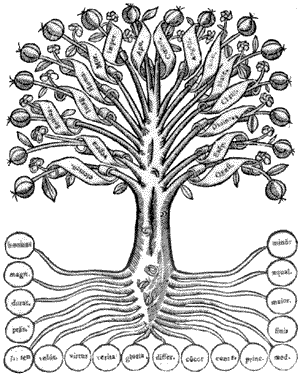zeitlich, temporel, temporal, transitório, tempóreo
«temporal»: Heidegger emplea aquí la palabra «zeitlich», y, para lo que hemos traducido «intemporal», la palabra «unzeitlich». Como se trata de una división de los entes que se ha hecho tradicional, usamos la palabra corriente con la que se traduce el término alemán correspondiente. En cambio, traducimos la misma palabra alemana zeitlich por «tempóreo», cuando esa palabra se refiere al sentido del ser del Dasein, es decir, a la temporeidad del Dasein. En ese caso «temporeidad» corresponde a la palabra alemana Zeitlichkeit. (Rivera; STRivera:Notas)
El «tiempo» sirve desde antaño como criterio ontológico, o más bien óntico, de la distinción ingenua de las diferentes regiones del ente. Es usual delimitar el ente «temporal (zeitlich)» (los procesos de la naturaleza y los acontecimientos de la historia) frente al ente «intemporal» (las relaciones espaciales y numéricas). Se suele contrastar el sentido «intemporal» de las proposiciones con el transcurso «temporal» de las enunciaciones. Se establece, además, un «abismo» entre el ente «temporal» y lo eterno «supratemporal», y se intenta franquearlo. «Temporal» quiere decir en cada uno de estos casos tanto como siendo «en el tiempo», una determinación que, a decir verdad, es bastante oscura. El hecho es que el tiempo, en el sentido del «estar en el tiempo», sirve de criterio para la distinción de regiones del ser. Cómo llega el tiempo a esta particular función ontológica y, más aun, con qué derecho precisamente eso que llamamos el tiempo funciona como semejante criterio y, por último, acaso en este ingenuo uso ontológico del tiempo se expresa la auténtica relevancia ontológica que posiblemente le compete, son cosas que no han sido cuestionadas ni investigadas hasta ahora. El «tiempo» ha caído como «por sí mismo», dentro del horizonte de la comprensión vulgar, en esta «obvia» función ontológica, y en ella se ha mantenido hasta ahora. (SZ:18; STRivera:39)
VIDE: zeitlich
temporal (STMSCC)
temporel (ETEM)
temporal (BTJS)
NT: Temporal, temporality (zeitlich, Zeitlichkeit) of Da-sein, 17-19, 38fn, 100fn, 234-235, 303-305, 321fn, 326-354, 356-357, 359-360, 363-377, 379, 381-382, 385-386, 388-389, 391-393, 396-397, 404-428, 435-437; authentic, 304, 327, 329, 331, 338, 348, 373, 385, 410, 414; inauthentic, 304, 326, 329, 331, 391, 424; ecstatic, 38fn, 100fn, 329, 331, 356, 366, 369, 388, 393, 408, 426, 437; horizonal, 369, 388, 393, 420, 426; ecstatic-horizonal 426; primordial, 325-331 (§ 65), 349 (of taking care), 436, et passim enables transcendence, § 69c. See also Clearing; Ecstatic unity; Horizon; Temporalität; Temporalizing; Transcendence (BTJS)
Zeitlichkeit (temporality) – Having invoked the “rhythms” of the living self in having itself in its origin in the self-world and having formalized its movement into a triple-sensed intentionality, Heidegger concludes WS 1919-20 (GA58) by noting, in passing, that such motivated rhythms must be comprehended in terms of Bergson’s distinction between objective cosmic time and concrete duration. The term “temporality” is first used in SS 1920 (GA59) in contrast with the “supratemporal” apriori, based on the stereotypical distinction, in the then prevalent argument against psychologism by Husserl and the neo-Kantians, between supratemporal judicative content and judicative actualization through cognitive processes “in time.” But instead of such an “objective” temporality or even the “pure” temporality of Husserl’s “original phenomenological time” of the stream of experience, Heidegger calls for an examination of the “time of the self-world” through historical Dasein’s continual relation to its own past. Temporality then becomes a formal indication of Christian life in WS 1920-21 (GA60), in order to determine the “actualization history” of life rather than its “object history.” First in Oct. 1922 (p. 13) is the specific temporality of human Dasein to be found by coming to terms with its impending death, which in turn would determine the basic sense of the historical. (511) The kairological temporality of Dasein in its contrast with the Temporalität of being does not clearly emerge until the opening pages of BT. (KisielBT:510)
